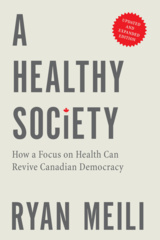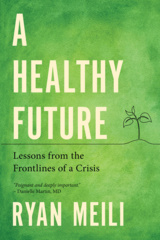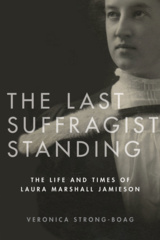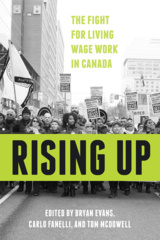
Bootstraps Need Boots
One Tory’s Lonely Fight to End Poverty in Canada
For more than four decades, Hugh Segal has been one of the leading voices of progressive conservatism in Canada. A self-described Red Tory warrior who disdains “bootstrap” approaches to poverty, he has worked tirelessly to bring about policies that support the most economically vulnerable in society. Central to his life's work has been the championing of a basic annual income for all Canadians.
Why would a lifelong Tory support something so radical? In this revealing memoir, Segal shares how his life and experiences brought him to this most unlikely of places. He recalls a childhood growing up in a poor immigrant family in working-class Montreal and how the events during his formative years made him aware of the blighting effects of poverty. He also recollects how connections with people like his grandfather Ben Segal, a Russian immigrant and union organizer, Prime Minister John Diefenbaker, and folksinger Joan Baez shaped his worldview.
Inspired by Diefenbaker’s visit to his school in 1962, Segal worked his way up through the ranks of the Conservative Party, where he served as a senior aide to Premier Bill Davis and as Prime Minister Brian Mulroney’s chief of staff, even making a bid to become leader of the party. Along the way, he worked across party lines to promote an anti-poverty agenda, most recently as an advisor on a basic income pilot project for the Ontario Liberal government. This book is a passionate argument not only for why a basic annual income makes economic sense, but for why it is the right thing to do.
This book is must-read for those who want to find better ways of reducing poverty’s serious effects on people, families, and communities. Readers will be drawn to the author’s passionate, often confessional, narrative about his life-long commitment to poverty abatement and the importance of not looking away from those in need.
Boot Straps Need Boots is a great Canadian memoir of a poignant Canadian experience recognizable to millions. And it is more than that. Segal recalls as a 12-year old the day Prime Minister Diefenbaker spoke to his school assembly. Diefenbaker had a way of mesmerizing schoolchildren. ‘The family table we call Canada is the finest table in the world,’ said the Prime Minister. ‘There is space and food for all.’ Here Segal comes to the point of Boot Straps, a plain argument for a national guaranteed income program.
Segal’s book reflects the author’s deep understanding of his country. He has travelled widely, especially during his Senate years, talking to hundreds of people who share with him a lived experience of poverty. He lucidly explains the hardwired link between poverty and spiralling health-care costs. Cutting the first will mean dramatic reductions in the latter.
After a lifetime in Progressive Conservative politics, Hugh Segal was known as a ‘Happy Warrior’ because of his legendary optimism and the generosity of his vision for Canada and for the under-privileged in our society. I have known Hugh extremely well for over forty years and I can say without hesitation that I have never met a more principled, thoughtful, and effective practitioner of the political arts in this splendid country of ours.
In a future where artificial intelligence may change the very nature of work, drastically affecting employment, few ideas are more worthy of study than a guaranteed annual income. And no one is better qualified than Hugh Segal to assess the pros and cons, both because of his wide experience in public policy and his specific knowledge of the Ontario Basic Income plan.
Hugh Segal, the son of a Montreal taxi driver who found his niche among Conservatives, has worked hard to introduce Basic Income to Canada. His memoir reminds us that compassion and good sense are values shared across the political spectrum.
The idea of a ‘basic minimum’ has been discussed for centuries – and it has once again become timely and important. Hugh Segal has long championed the cause and his book is a vital contribution to an important debate.
Part memoir, part historical narrative, and part call to action, Bootstraps Need Boots is a must-read for anyone committed to tackling and ending poverty in Canada, regardless of their political stripe or affiliation.
A child can learn that a toy box shouldn’t stand between a cold neighbor and basic warmth, but it takes someone like Hugh Segal to carry that lesson with him the rest of his life in the ceaseless pursuit of universal freedom from want and fear.
Hugh Segal writes as he speaks – with eloquence, passion, and conviction. His belief that conservatism is about broadening the mainstream, not preserving privilege, and his portrayal of the case for basic income in that context, makes Segal's intervention into the basic income debate genuinely distinct and valuable.
Hugh Segal, OC, O Ont, is a remarkable Canadian whose multiple vocations have spanned politics, academia, business, and communications for more than four decades. He has served in myriad capacities in provincial, federal, and international politics, including formal roles as chief of staff to Prime Minister Brian Mulroney and principal secretary to Premier Bill Davis. Internationally, he was a member of the nine-person Commonwealth Eminent Persons Group that proposed reforms around democracy, rule of law, human rights, gender equity, judicial independence, and modernization to the Commonwealth Heads of Government meeting in 2011.
Hugh Segal has taught at Queen’s University’s School of Policy Studies for twenty years and has lectured at the University of Toronto Faculty of Law. He is a distinguished fellow at the Munk School of Global Affairs and Policy Studies, a life-time fellow of the Institute for Research on Public Policy in Montreal,a fellow of the Canadian Global Affairs Institute in Calgary, and a former principal of Massey College.
He is also an outspoken political commentator and the author of seven books on public policy and the nature of conservatism in Canada – the most recent being Two Freedoms: Canada’s Global Agenda. In 2016 the Ontario government commissioned him to devise a blueprint for a guaranteed annual income pilot project in Ontario. Although shelved by a change in government in the province, it serves as an important model to put poverty reduction into practice.
Foreword by Andrew Coyne
Preface
1 The Cheery Edge of Poverty
2 The Missing Toy Box
3 Happiness, Anger, Religion, and Hockey
4 A Special Assembly at School
5 Starting the Political Voyage
6 Clear Choices Emerge
7 Policy Linkages and a New Idea
8 Sinews of Impunity
9 Learning from the Best
10 On the Davis Team
11 From Public to Private and Back
12 Learning from Mulroney
13 The Battle in the Senate
14 Testing a Better Way
15 Courage and Fairness Matter
Appendix; Selected Bibliography; Index
















